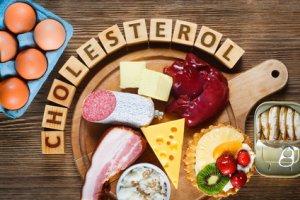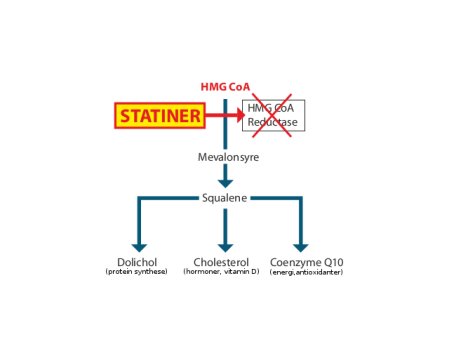Q10 and cholesterol make an essential team
- but ageing processes and cholesterol-lowering drugs inhibit the body’s Q10 synthesis
 No matter how you twist and turn it, cholesterol is an essential substance, and we humans produce most of it ourselves. What is important is to make sure that the cholesterol we have in our blood does not oxidize, and that is something which Q10 and other antioxidants take care of. Stable blood sugar levels also help us maintain a healthy cholesterol balance.
No matter how you twist and turn it, cholesterol is an essential substance, and we humans produce most of it ourselves. What is important is to make sure that the cholesterol we have in our blood does not oxidize, and that is something which Q10 and other antioxidants take care of. Stable blood sugar levels also help us maintain a healthy cholesterol balance.
The fear of fat that many people are haunted by has made them turn away from otherwise healthy foods such as eggs and butter, which are also a source of cholesterol. But cholesterol is in fact an essential substance that gets incorporated in all cell membranes as a shield against free radical attacks and diseases. Cholesterol plays an essential role in the nervous system and immune system, and it is required for the production of sex hormones, stress hormones, and vitamin D. The liver normally produces 4-5 times more cholesterol (from carbohydrate) than the amount we get from our diets. In the case that we don’t consume any animal fat, the liver must produce all the cholesterol that the body needs for various purposes.
What is important is that the cholesterol is protected against free radicals when it circulates freely in our blood. This is where cholesterol and Q10 team up as a quite unique pair.
Nonetheless, different forms of cholesterol such as LDL (low-density lipoprotein) and HDL (high-density lipoprotein) must be present in the proper balance. If there is too much LDL, it may be a sign of stress, inflammation, overweight, enlarged waist circumference or problems with blood sugar levels and the carbohydrate metabolism.
Did you know that your brain contains more cholesterol than any other part of you?This is because the chemical processes that initiate nerve impulses in the brain require a constant, uninterrupted supply of cholesterol. |
Antioxidants protect cholesterol
According to leading scientists, cholesterol is not a problem unless it oxidizes as a result of being exposed to free radicals. This oxidation is what sets the stage for atherosclerosis. Free radicals are a waste product of cellular oxygen utilization during the energy turnover. The free radical load is heavily increased by smoking, stress, inflammation, poisoning, medical drugs, radiation, and ageing processes. The only agents that are able to protect the cells and cardiovascular system against free radicals are various antioxidants. Q10 plays a crucial role in this picture, and the diet also contributes with vitamins A, C, and E plus selenium, zinc, and different plant compounds.
Q10 takes part in the energy turnover and protects cholesterol
Q10 is an essential co-enzyme that takes part in the energy turnover in virtually all cells.
The diet only provides minimal amounts of Q10. Our endogenous Q10 production is therefore the primary source of this vital compound. The body’s own Q10 production peaks at the age of 20-25 years from which point it starts to decrease. Many people feel this accelerating decrease around the age of 50 years, primarily as failing vitality and impaired muscle strength. Stress, certain diseases, and the use of cholesterol-lowering drugs may also deplete our Q10 levels (this will be addressed later on).
Many people choose to take a Q10 supplement to get more energy, but this fascinating little co-enzyme even functions as an outstanding antioxidant that protects cholesterol and our cells.
Q10 in its two forms
Q10 occurs as ubiquinone, which is important for our energy metabolism, and as ubiquinol, which is the antioxidant form. Helped by enzyme processes that require the presence of selenium, ubiquinone gets converted into ubiquinol – and vice versa – in a continuous cycle, depending on the body’s particular need for the two forms of the compound. Most people can easily handle this back-and-forth conversion of Q10, and the majority of scientific studies with Q10 are conducted with Q10 in its ubiquinone form, which is more stable.
The two forms of Q10
|
Q10’s absorption and circulation with cholesterol
Q10 is a lipid-soluble compound that gets absorbed in the small intestine, either from food or from supplements. From the small intestine, Q10 is conveyed to the intestinal lymphatic system and from there to the bloodstream where levels peak after 6-8 hours. Once Q10 has been absorbed in the small intestine, most of the ubiquinone gets converted into ubiquinol. During the transport in the lymphatic system and the bloodstream Q10 is bound to LDL cholesterol, to which it is biochemically related. Ubiquinol functions as a unique antioxidant in the blood and lymph, where it protects cholesterol and the cardiovascular system as such against oxidative stress caused by free radicals. During the energy metabolism, ubiquinol gets converted into ubiquinone in the cellular powerhouses (mitochondria).
Cholesterol, Q10, and atherosclerosisIn the blood, Q10 is bound to LDL cholesterol before it gets absorbed in the cells. This means that Q10 contributes to the protection of cholesterol against oxidative stress and atherosclerosis, which people can develop regardless if their cholesterol is high or low. |
Cholesterol-lowering drugs inhibit the body’s Q10 synthesis
Millions of people worldwide take cholesterol-lowering medicine (also known as statins), which are some of the most commonly used medical drugs. However, there is increasing awareness of the side effects caused by this class of drugs. Cholesterol and Q10 are biochemically related compounds that are synthesized from an enzyme called HMG-CoA. Because cholesterol-lowering drugs work by blocking the body’s production of this enzyme, this also affects the body’s synthesis of Q10. This explains biochemically why statins typically cause muscle pain, fatigue, shortness of breath, impotence, and physical and mental decline. The cells simply lack energy.
A Danish study that is published in Journal of the American College of Cardiology (JACC) reveals that 40% of patients who take statins experience aching muscles. Among active athletes, as many as 75% have this problem, which means that the muscle pain problem increases with physical activity.
 Both cholesterol and Q10 are synthesized from the enzyme HMG-CoA. Therefore, cholesterol-lowering drugs (statins) also inhibit the body’s Q10 synthesis. One can compensate for this by combining statins with a Q10 supplement.
Both cholesterol and Q10 are synthesized from the enzyme HMG-CoA. Therefore, cholesterol-lowering drugs (statins) also inhibit the body’s Q10 synthesis. One can compensate for this by combining statins with a Q10 supplement.
Statins may cause cardiovascular problems – which is a paradox
Because statins inhibit the body’s Q10 synthesis, these drugs negatively affect more than the energy turnover alone. As mentioned earlier, Q10 is also a powerful antioxidant and is therefore vital for the protection of cells and the cardiovascular system.
According to the American cardiologist, Peter Langsjoen, a statin-induced Q10 deficiency may account for the enormous increase in the rate of heart failure that has been observed in the United States. First of all, the heart requires enormous amounts of energy to contract day and night. Secondly, Q10 as an antioxidant protects the heart against free radicals. Writing in the journal Diabetes Care, researchers from Phoenix VA Healthcare System conclude that statins increase the risk of diabetes in healthy people and worsen cardiovascular problems in diabetics due to the lack of Q10
Sex life and potency
Statins may even destroy your sex life and lead to impotence. According to a large American study, male statins users experienced that their ability to obtain an orgasm had been reduced by 50%. This, according to the researchers, was because both sex and orgasm require a lot of energy. Because statins block the body’s Q10 synthesis, this affects the men.
The Q10 molecule as a unique redox pairThe phenomenon that Q10 can function in two forms is known as a redox pair and is biochemically unique. The Q10 molecule interchanges between two separate and vital functions, none of which can be replaced by anything else. |
Q10 supplements can reduce statin-induced side effects
Side effects caused by statins may be reduced by combining the cholesterol-lowering drugs with supplements of Q10, which can compensate for the lack of Q10. This was ween in a 2007 study where American researchers gave 100 mg of Q10 or placebo to a group of statin users who had muscle pain because of their medicine. The group that got the combination of Q10 and statins had 40% less muscle pain compared with the placebo group. Also, the patients in the Q10 group felt less limited by their side effects.
Q10 supplements must have the right quality
As mentioned earlier, Q10 is a lipid-soluble substance. No matter what type of technology a manufacturer employs when manufacturing Q10 supplements, the Q10 molecules will always be lipid-soluble. In different kinds of Q10 raw material and supplements the Q10 molecules tend to aggregate in crystal-like structures that are unable to dissolve at normal body temperature. In order for these crystals to dissolve completely so the individual Q10 molecules can pass through the intestinal membrane and get absorbed, it is necessary to use a special oil- and heat technique.
The quality of a Q10 supplement is determining for the absorption and utilization of Q10, both of which are closely related. Always choose a product that can document its quality and bio-availability so you are sure that the Q10 gets into your blood and reaches your cells.
It is important to address elevated cholesterol in the long run
As described earlier, elevated cholesterol and an imbalance between the two cholesterol types (LDL and HDL) may be caused by stress, an enlarged waist circumference, or blood sugar problems caused by overconsumption of refined carbohydrates. Overloading your body with carbohydrates may lead to insulin resistance where the cellular uptake of glucose is impaired. Insulin resistance is a key element of metabolic syndrome (an early stage of type-2 diabetes), which also features elevated cholesterol and hypertension. In other words, because elevated cholesterol may be a result of consuming too much carbohydrate, there is no reason to be afraid of fat as such – as long as you eat the right types of fat.
The new and positive messageThe US health authorities have finally acknowledged that foods with a high natural cholesterol content do not represent a problem. Eating butter, eggs, shrimp and other cholesterol sources as part of an otherwise health and balanced diet should not give cause for concern. |
References:
Tor Ole Kjellevand. Kolesterol, venn eller fiende? Helsemagasinet Vitenskap og Fornuft. 2015
Pernille Lund: Q10 - fra helsekost til epokegørende medicin. Ny Videnskab 2014
Search for more information...
- Created on .









 "After about one week of taking the Q10 supplement I could feel a huge difference," says 23-year old Alan Piccini, who has been suffering from extreme fatigue and muscle aches ever since he was a child.
"After about one week of taking the Q10 supplement I could feel a huge difference," says 23-year old Alan Piccini, who has been suffering from extreme fatigue and muscle aches ever since he was a child. “Taking capsules with co-enzyme Q10 has freed me of the severe side effects of my cholesterol lowering medicine,” Mrs Franken explains.
“Taking capsules with co-enzyme Q10 has freed me of the severe side effects of my cholesterol lowering medicine,” Mrs Franken explains.